Peter MALONE
Saturday, 09 October 2021 13:03
Summer 85/ Ete 85
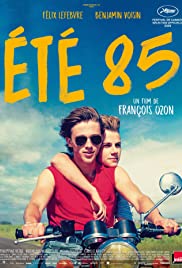
SUMMER OF 85/ ETE 85
France, 2020, 100 minutes, Colour.
Felix Lefebvre, Benjamin Voisin, Philippine Velge, Valeria Bruni Tedeschi, Melville Poupaud, Isabel Nanty..
Directed by François Ozon.
François Ozon has been making significant films for a quarter of a century – and, prior to his moving into feature films in the late 1990s, he spent 10 years making short films and short documentaries. He makes films with great assurance.
The title of the film evokes sunshine and light, the French coast, the beaches, crowded, boats sailing on the sea. However, the title of the novel on which the film is based is Dance on My Grave, a novel by Aidan Chambers. Quite a sombre title, the introduction of the theme of death which does pervade the whole film, and a sequence bringing to life thse title of the novel takes place at night, in the dark.
There is immediate ambiguity for the viewer, the introduction to the 16-year-old Alexis, preferring to be called Alex (a significant performance by Felix Lefebvre), on holiday from school where he has been encouraged by a sympathetic teacher in his creative writing (Melvil Poupaud, a regular in Ozon on films). But, Alex’s voice-over talks about death, seeing a corpse, and revealing that the corpse in question is his friend, David (Benjamin Voisin), and Alex is being accompanied by a policeman. This puts a pervading gloom over the reminiscences about the summer of 85.
Alex is sunbaking on a small boat when a storm comes up and his boat capsizes, Alex fortunately rescued by David on another boat. So, a sympathetic beginning of a friendship.
David works at a sports store established by his father, now dead, and managed by his rather exuberant mother (Valeria Bruni Tedeschi who also appeared in other Ozon films). The two young men are comfortable with each other, though Alex is somewhat wary, wanting explanations, trying to think things through. But, walking along the beach, talking, riding on motorbikes, going to the cinema, Alex being persuaded to work in the shop (his dockworker father eager for him to be occupied with a job, his mother, sympathetic, working at home).
The audience is more aware of Alex and his sexuality, sexual orientation, before he is. But, the audience will have something of a puzzle about David – seductive in his manner, controlling situations, manifesting more and more some self-centredness.
While the audience knows from the beginning of the film the David is dead, we do not know how this occurred, and what was Alex’s responsibility, he being accused of causing David’s death. How? Why?
And that is the drama in the second part of the film. David’s death also has devastating consequences for Alex and his feelings, his trying to understand David and the relationship, complicated by an encounter with an English au pair visitor, Katie, and becoming more desperate, Alex wanting to see David’s body for a last time (and a dramatic setup in the morgue) and, David having promised that whoever outlived the other would dance on his grave. And that becomes a driving force for Alex.
Katie has some wise words for Alex and the audience would certainly agree, that Alex had fallen in love, a passionate obsession, with an image of David that he created rather than the real David.
But, Alex, realisation of his sexual orientation, is 16, his life ahead of him.
1. The tone and mood of the title? Summer, some, fine weather, the beaches?
2. The tone of the original novel, Dance on My Grave? The pact between Alex and David?
3. The work of the director, relationships, tensions, homoerotic?
4. The setting, the coast, cliffs, the beaches, the crowds? On the water? Homes, streets, shops, the police station? The musical score? The song: I am sailing?
5. The time structure? Alex, with the police, going to the station? The progress of that line of action, changes, with his parents, with the teacher, the discussions, the writing of the story, the importance for Alex? Sharing it with the teacher? The interrogation by the case worker? Alex and his bewilderment? About himself? About his relationship and action?
6. The significance of the textemphasis on death, the corpse, responsibility, David as the corpse? Audience anticipation?
7. The time structure for the summer episodes: Alex, studies, love of writing, discussions with his teacher and encouragement, issue of work, his relationship with his parents, hard-working mother, at home, his father on the docks? Sailing, capsizing in the storm, the rescue by David? Going home with him, meeting his mother, the bath, naked, David’s clothes? Later returning with the clothes? The initial bond with David?
8. David, age, personality, relationship with his mother, his mother’s concern, the death of his father, the grave? Sailing, the yacht? Rescuing Alex, bringing him home? Ordinary, friendship, discussions about friendship, the earth and dancing on the grave, companionship with Alex, their walking, talking, along the beach, at the cinema?
9. Alex, no overt initial aspects of his sexual orientation? The experience with David’s mother in the bath? His response to David, walking, talking, cinema, the invitation to work in the shop, his accepting? The encounter with the drunken young man, Alex and his negative reaction, David helping him, to the beach, David returning late home?
10. Alex falling in love, passionate, the sexual encounter, the aftermath? Katie’s later comment that Alex had created the ideal personality and seen it in David himself? In love with love?
11. Katie, the encounter, chatting, English, learning French, a pair? Later meeting, the introduction to David, her going sailing, Alex and his pouting jealousy, David spending the night with Katie? Her reaction to his death, not realising the relationship, her apology?
12. David’s mother, genial, protective of her son, the management of the shop? Her reaction to her son’s death, from affirming Alex to turning on him? Refusing to see him, Alex’s insistence, the phone calls and wanting the photo, her charges?
13. Alex, the clash with David, David and his manner, revealed as seductive, self-centred, exploitative? Alex running away, David in pursuit, the crash, his death, Alex seeing the news on the television? Going out, the consequences?
14. Alex, desperate, the passion, wanting to see David’s body, Katie and her help, the female disguise, into the morgue, the help of the attendant, Alex and his fit, on the body, dragged off, the wig and the dress? Return home, talking with his mother, pretending that it was a play, the story of his uncle Jackie and his father’s disdain, asking his mother later whether she liked uncle Jackie?
15. The pledge of dancing on the grave, Alex going to the cemetery, searching the site, the fit and digging at the soil? His later return, the dance, ‘I am sailing’? The police and his being taken away?
16. The charges, the writing of his story, as testimony, the hearing before the judge, the sentence and social work? Those present – and Katie leaving?
17. Alex calmer, working on the beach, the encounter with the young man who had been drunk, they going sailing together…?
Published in Movie Reviews
Published in
Movie Reviews
Saturday, 09 October 2021 13:03
Comrade Dov
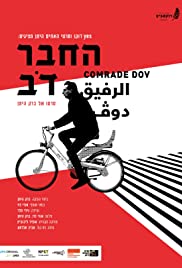
COMRADE DOV
Israel, 2019, 75 minutes, Colour.
Directed by Barak Heymann, Uri Levi.
This is a film of particular interest to Israeli and Palestinian audiences. However, for audiences worldwide, it raises many of the issues in the history of Israel, life in the Gaza Strip, in the conflict between Palestinians and Israelis, the dialogue between Arabs and Jews.
The brief documentary focuses on a significant politician, Dov Khenin, from Tel Aviv, from an affluent family, Ashkenazi tradition, one-time Communist, all-time Socialist, member of the Israeli Knesset for 13 years.
Directed Barak Heymann, a journalist in the early 2000’s, began his interviews with Dov, recording and filming. Taken by the personality as well as Dov’s political views and commitment, Heymann continued to film him over the years. This is a portrait of the man, often in close-up, genial, always open to dialogue, fiercely committed to his beliefs and courses.
He was elected to the Knesset representing the Jewish- Arab party. With his strong belief in socialism, he is also a believer in peace negotiations, war being a lose-lose situation. He has brought these convictions to his work in the Knesset, seen making a number of speeches, and at the end listing pieces of legislation to which he contributed. There are also very rowdy scenes of the meetings of the finance committee of the Knesset, his interventions, arguments, being shouted down, voted against, ousted. Yet, at the end of his period, he makes a speech in the Knesset, fellow-members listen and he is applauded as he leaves Parliament.
Dov is always very strong in being present at protests and demonstrations, joining with Arabs, speaking Arabic, sympathetic to causes, issues of the settlements (and seen in discussions with young people, especially from the settlements who see the Arabs as perpetual enemies and killers), the destruction by demolition of the Arab village set up in 1956 but to be transformed into a Jewish settlement. There are many sequences of protests and marches.
There are some personal interviews, a sympathetic interviewer voicing anti-Arab views and Dov responding, accusing the interviewer of ignorance and trying to put balanced viewpoints for television audiences – Dov then being asked about his ancestry, the influence of his parents and grandparents, their social concerns, interventions, and even to his being member of a singing group, and his attempt at a song.
Dov is strong on the advocating of a two state land, which means that he has fierce opponents, many sympathetic listeners, and the film questions a lot of the Israeli behaviour since 1948, and, while provoking opponents, still hope for peace, dialogue between Arabs and Jews.
Published in Movie Reviews
Published in
Movie Reviews
Saturday, 09 October 2021 13:03
Anton
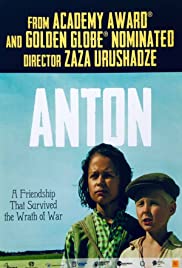
ANTON
Ukraine, 2019, 102 minutes, Colour.
Nikita Shlanchak,Mykyta Dziad, Sebastyan Anton, Tetiana Grechik.
Directed by Zaza Urushadze.
It is the end of World War I, and the setting is Russia/Ukraine, to become the Soviet Union. Horseback Bolshevik forces ride through the countryside, demanding loyalties, killing and destroying. Trotsky himself is seen as part of these forces, along with a viciously aggressive, Commissar, Dora, in love with Trotsky.
In this area of Ukraine, there are Jews in the community. There are also migrant Germans from the 19th century who settled there. Anton is a youngster, one of the Germans. His best friend is Yasha, some of the Jewish shopkeeper.
On the one hand, there are many delightful sequences showing the two boys, their friendship, shared experiences, discussions about respect of religious aspects of their lives, especially whether everyone would be in the same heaven. There are other children in the village and Anton has to care for his sister, Emma.
But, in the background, then in the foreground, there is the sense of dread. Despite the beauty of the landscapes in the countryside, there is a deadly atmosphere. The Germans are trying to protect others from the Bolshevik rampagers taking the grain. The Jewish storekeeper serves as something of an informant to, Dora. There is tragedy for Anton’s father. There are threats to Yasha’s father. And, a strong influence in the village is the local priest, Friedrich, who has a past in social uprisings but keeps a watchful eye on the village, protective of his sister, Anton’s mother. He becomes a significant part of the political manoeuvring is as well as the social uprisings.
There is drama in the film showing Trotsky and his relationship with Dora, his ambitions, his riding on the village and Dora’s intentions to “snuff out� the Jewish store keeper. The two boys overhear her, don’t quite know what it meant, and then are caught up in an assassination attempt and abduction of Trotsky.
The German family leave for the Fatherland. Friedrich has a final confrontation with Trotsky – and the rest is left to our imagination or to our knowledge of Soviet Union history.
Humanely, the framework of the film is the elderly Yasha discovering where Anton is, now in hospital, and coming to visit him, moments of happy reunion.
1. The title, Anton, the young boy, in the Ukraine, in Bolshevik Russia? And the impact of the finale?
2. Ukraine, the settings, the village, shops, the church, homes, farms? The surrounding countryside, the plains? The musical score?
3. The historical setting, social setting, the Bolshevik Revolution, the emerging of the Soviet Union, the Bolshevik writers, the raids on villages, the executions, the taking of grain?
4. The presence of Trotsky, his role in the revolution, personality, ambitions? With the riders? His relationship with Dora, the attempt on his life? His being free – until his assassination?
5. Jews and Catholics? The storekeeper, his family? But his informing to the Commissar? Yasher, his friendship with Anton, the bond between the religions? The Catholic family, coming from Germany, persecution from the Bolsheviks, the plan to return to the Fatherland? The church, Father Friedrich, his presence, ideological stances?
6. Th e story friendship between the two boys, their age, personalities, playing together, Anton looking after his younger sister, the usher and his eye for the little girl? The background of the events? The tunnel in the hay? Overhearing Dora is planned to kill the informant? The reaction, in the ruins, hearing Trotsky’s cry, believing his story, setting him free?
7. Anton’s family, his father, Germanic background, language at home, relationship with his wife, love for his children, the issue of the grain, confronting Dora, her shooting him? The consequences for wife and family, that they return to Germany?
8. Friedrich, the present, his cassock, his being part of the family? The ceremonies, the church? The revelation about his past, political stances and action? With Trotsky? Organising with the storekeeper, the attack on the entourage, the shootings, killing Dora? Abducting Trotsky, hiding him on the ruins?
9. Friedrich, unable to kill Trotsky? Trotsky’s escape, confronting him in the church, their past, killing him?
10. The storekeeper, trying to escape, his being shot? The family, in the wagon, their fleeing? The end of the narrative of the past?
11. The framework, the older Yasha, the clouds, in the plane? Going to the home, meeting Emma, Anton and his coma, consciousness, the reconciliation?
Published in Movie Reviews
Published in
Movie Reviews
Saturday, 09 October 2021 13:03
Grizzlies, The
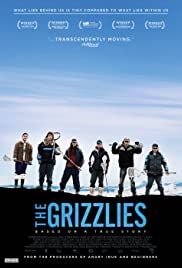
THE GRIZZLIES
Canada, 2018, 102 minutes, Colour.
Ben Schnetzer, Tantoo Cardinal, Will Sasso, Boo-Boo? Stewart, Emerald Mc Donald, Anna Lambe.
Directed by Miranda de Pencier.
No, not a nature documentary about bears in the American or Canadian woods. The Grizzlies is the title of a sports team, an unlikely group, underdogs, going into competition, finding themselves. Sounds like a sports film formula – and, in some ways it is, but there is much more to it, and there is much more edge.
The setting is in northern Canada, an isolated community. And the majority of the inhabitants are Inuit. With 20th century in 21st-century changes, the youngsters in the community have very little to look forward to, not interested in education, have some loyalty to their parents and the traditions, with many of the older generations warning them against the white man’s world. There is a school, many of them don’t go – although, during the initial credits, there are many black and white photographs of education in the area, the missionaries, the sisters, the discipline…
The film opens rather lyrically, a young man walking through the snow clad mountains – and then killing himself. The words on screen telling us that this area has the highest youth suicide rate in the country. So, quite a sombre setting – and this issue of youth suicide recurs during the film and is strikingly dramatic in the final 25 minutes.
And, the young people just sit around, drinking, drugs, idle.
And, into the situation comes a very earnest and enthusiastic young man, graduated as a teacher, appointed here, but practically no preparation for such a cultural change, bringing his white Canadian baggage to the situations, to the encounters, destined for failure. His played by the genial Ben Schnetzer (Death and life of John Donovan, Pride,). It looks as though it is going to be one of those stories of a white saviour coming in to redeem the locals and bring them to some kind of celebration. And, in a way it is. However, much of the dialogue targets him, especially from the veteran school principal (veteran actress Tantoo Cardinal), and, in his disappointment and self-blame taught the end, he has to be reminded that he has urged the young people to go forward, no matter what, and that this issue is not just about him.
The first part of the film is rather depressing, showing the harsh situations for adults and youngsters. While rice has an idea to introduce lacrosse, he needs the support of some of the young people themselves. His most devoted student, rather silent, heavy build and self-conscious, Miranda (Emerald McDonald) has a talent for organisation, and comes out of herself to start organising and advising. In a sense, she is the moral and optimistic core of the whole drama. The young people follow the lead of one of their peers, are interested, get the hang of lacrosse, get enthusiastic, play.
The crisis comes when Russ applies for the team to go into the national competition in Toronto. The principal disagrees. The town Council, with an annual grant from a mining company, think that giving the team money is a waste and wrong emphasis. Russ is impetuous, pushy and arrogant (the principles words to him), but he has to begin to learn some of the local customs, language, listen as well is talk to parents and grandparents.
It is not a spoiler to say that they do get to Toronto – but with not quite the results they might have anticipated, but achieving some sense of pride and camaraderie.
It is that kind of inspirational sports film – but, given the social conditions and the prevalence of youth suicide, it is an inspiration with challenging edge.
1. The tradition of inspirational films? The tradition of sports films? The creation of a team? Play and spirit? Underdogs? The use of the formula here? Variations?
2. Based on a true story, the photos of the team and individuals at the end? Russ Shepard and Kyle as technical advisors on Lacrosse, Shepard appearing as the Toronto referee?
3. The summer opening, the young man walking in the mountains, shooting himself? The information about statistics and youth suicide in the area? And the later suicide at the end of the film?
4. The Inuit outpost, the community, the different generations, language, traditions, adaptation to the 20th and 21st-century is, hostility to the white man’s way? The social settings, the school, absenteeism? Work opportunities? Fishing and markets? Hunting?
5. The young people in the town, banding together, sitting, idle, drinking, drugs? Dispirited?
6. Russ Shepard, his background, teacher qualifications, the later offer of prestigious positions, his presence in the North? Arrival, the discussions with the school principal, his class? Some present, some absent, lack of interest, and has an answering back?
7. Russ, unprepared for the culture, the image of the man from the South coming in, solutions, pushy and arrogant, slow in listening, slow in learning?
8. , The white man, place in the town, friendly with Russ, helping him out? Drinking?
9. The variety of young people, Adam and his leadership, the strong stances of his grandparents? Zach, his young friend, family, the abusive father? Kyle, standoffish, his own background? The contrast with the girls? Spring, relationship, her being battered, absent from school?
10. Miranda, heavy build, seemingly sleepy, her answers in class, her skills, organising, ideas, explaining to Russ about inviting Adam as leader, her continued work, skills, her blossoming, the clashes at home, the violence? Her coming out of herself? The disappointment for Russ, his wanting to leave, her quoting him against himself, her telling him that was not all about himself?
11. The idea of la cross, Russ and his skills, the agreement of the principal?
12. The initial failure, Adam Cumming, the group, discovering the game, the rules, the skills, contact? The practices, the increasing skills, the effect on the young people, morale? Some approval from the adults, disapproval?
13. The range of fundraising, the enthusiasm, Miranda and her charts? Her writing to the group with Grants? The request to the town Council for money from the grant? The meeting, Russ and his impatience? The principal and the decision of refusing the money for the trip to Toronto? The impassioned plea about the effect on morale?
14. The preparations? The competition? Zach, his father, the injuries? The young friend and his not being able to go? Zach, killing himself? The effect of the death, the funeral?
15. Russ, upset, packing to leave, the challenge from Miranda?
16. Adam, his grandparents, Russ and his visit, the exchange of views? The grandparents and their support?
17. To Toronto, the matches, the exhilaration of the city, defeats, spirit, the decision to get one goal – and the dramatic success and its effect? The happy return?
18. The ever-tension between stories of “saviours� coming into communities, and the listening to the communities and the communities achieving their own success?
Published in Movie Reviews
Published in
Movie Reviews
Saturday, 09 October 2021 13:03
Ellie and Abbie (and Ellie's Dead Aunt
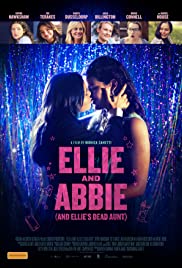
ELLIE AND ABBIE (AND ELLIE's DEAD AUNT)
Australia, 2020, 80 minutes, Colour.
Sophie Hawkshaw, Zoe Terakes, Marta Düsseldorp, Rachel House, Julia Billington.
Directed by Monica Zanetti.
With such a title, this brief film is asking for attention. Obviously, a comic tone, and the suggestion of the supernatural with the dead aunt.
In fact, this is a coming-of-age, coming out comedy. It is the story of Ellie, captain of the school, in her final year, conscious of her sexual orientation, attracted to a fellow student, Abbie, wanting to invite her to the school dance but, self-conscious, unable to do so. She does contrive to get herself into detention, the next desk to Abbie but confuses the situation.
Ellie has got on well with her mother – until now. Suddenly disclosing her orientation, she is upset with her mother’s seemingly accepting green but her reservations. The mother is played by prominent Australian actress, Marta to sword or – who has some moments of pathos, moments of comedy, and a heartfelt speech to her daughter.
And then there is the dead aunt. She is Aunt Tara, Ellie’s mother’s sister, who explains she was killed in a car crash. She has arrived, spasmodically appearing, and unpredictable, to help Ellie through her emotional and coming out crisis. She has a lot of comic deadpan lines as well as a lot of advice and encouragement.
One of the difficulties for the impact of the film is that Sophie Hawkshsaw appears to be much older than the alleged 18. On the other hand, Zoe Terakes (who had appeared in the television series Wentworth in a transgender role) brings a range of emotion to her role, irritation, nonchalance, clashes with Ellie.
The crisis comes when Abbie presents a school project about the impact of a lesbian campaigner at a rally in 1989. It is Aunt Tara, and Ellie is shocked, insulting Abbie, stating that this was all lies.
The soothing presence in the film is Ellie’s mother’s close friend, the ever genial Rachel House (the kayaking instructor in Penguin Bloom) who was Tara’s partner in the old days (seen at rallies in flashbacks). Eventually, Ellie talks with her mother, finds out what really happened and why her mother has concealed the story, gets dressed up for the dance with the help of her mother and Patty, but has still not invited Abbie.
There has been some talk of identifying lesbian interest by mentioning the AFL, Australian Football League and a favourite player. Ellie has always thrown a football landing on her drive over the fence. This time she keeps it, writes a note, sends it as an invitation to the dance – and, happily, all turns out well.
While there have been a number of films from the United States and Europe dramatising teenagers and young adults, male, coming to terms with their orientation and coming out, there have been few films for teenagers and young women. This comedy will be welcomed by those involved LBGTQ campaigns.
Published in Movie Reviews
Published in
Movie Reviews
Saturday, 09 October 2021 13:03
Jack Bull, The

THE JACK BULL
US, 1999, 115 minutes, Colour.
John Cusack, John Goodman, L.Q.Jones, Miranda Otto, John C.McGinley, John Savage, Rodney A.Grant, Kurt Fuller, Rex Linn, Jay O Sanders, Drake Bell, Ken Pogue, Glenn Morshower, Ned Bellamy, Scott Wilson.
Directed by John Badham.
With an enigmatic title (referring to the strong canine qualities of the leading character and a combination, Jack Russell and pitbull), this is a very strong western, set in the late 1880s, in Wyoming territory, with the ambitions of Wyoming becoming a state in 1890.
Interestingly, this film was made by HBO for television but it certainly could stay and theatrical screening. The mountain scenery of Wyoming is outstanding and beautiful, one of the characters remarking that the the mountains looked like God’s Cathedral without a roof and God over-boasting! There are the open plains for horse breeding, the small towns and homesteads, Cheyenne and its Frontier flavour, the atmosphere for statehood.
While this is the background, the central character is Merle Redding, played with stall which strength and underlying emotion by John Cusack. He confronts the ambitious and loud-mouths local land baron, played by veteran L.Q.Jones in one of his best performances. Their conflict leads to Joneses doublecrossing, reading becoming a victim, applications of Lord to the authorities in Shining, one judge in league with the Baron, dubious behaviour from the attorney general.
Which leads to Redding, after his wife (a spirited performance from Miranda Otto) has gone to Cheyenne to negotiate legal solutions and is killed by runaway dray, to assemble the men who are in rebellion, to form a posse, to pressure Ballard to restore the horses whom he has neglected and maltreated while Redding is at the sales.
The men of the posse are loyal to Redding, especially his partner, native American Indian Crowe, Billy (Rodney A.Grant). But, the risk of violence and accidents is always possible and there are some deaths, followed by lies during the subsequent trial.
The film has a very strong supporting cast led by John Goodman as the letter-of the-law judge, Scott Wilson as the acting-Gov, John Savage as a loyal supporter of Ballard, John see McGinley? as a loyal supporter and friend of Redding.
The screenplay is based on the 18th century novel by German author, Heinrich von Kleist, about a revolutionary, Michael Koolhaas. (This story was filmed in Denmark in 2016 with Mads Mikkelson in the title role, a far more ruthless character than in The Jack Ball.) The present screenplay was written by Dick Cusack, John Cusack’s father, with his brother, Bill Cusack, as a producer.
The last part of the film involves court cases, Ballard finally getting his comeuppance, Redding found guilty of a murder 50 did not commit and sentenced to be hanged. He goes to the gallows, a proud man, wanting justice, supporting his young son, a Stoic hero.
1. The title? The dogs? The spirit of Myrl Redding?
2. Wyoming territory, the late 1890s, the move towards statehood, the banners, the campaigns, those for, the local land barons against?
3. The film made for television, strong cast, strong plot, beautiful locations, enough for theatrical release?
4. The background of the mountains of Wyoming, beauty, majesty, crags, the plains, the homesteads, stables, local towns, the city of Cheyenne, Frontier, the streets, offices, hotels, prisons? Authentic feel? The musical score?
5. Myrl Redding, John Cusack screen presence? His family, his son working with the horses, Cora, the household, strong spirit? His team, Woody as loyal, friend, working? Billy, Crowe Indian, friendship and partner, work with the horses?
6. Ballard, the presence of L.Q.Jones, appearance, manner, arrogant, defiant, his property, his entourage, Slater, his presence and loyalty, the black worker and his defiance? The clash with Redding, ideological differences with statehood, his revenge?
7. The horses, the trek to the sales, Ballard and the imposition of his tax, the discussions, Redding trapped, the payment, leaving the horses? Into town, the sales, the discussions about Ballard? The return, the state of the horses, Billy and his being humiliated? Redding’s anger, the confrontation?
8. The legal issues, Redding and the discussion with the lawyer, his promises, his eventually doing nothing, returning, avidly taking Redding’s money, scene later with the corrupt judge? Judge Rankin, the barber sequence, his dismissing the case? Deals with Ballard?
9. The preparations for statehood, the visitors from Washington, the role of the military as escorts, the governor, his ambitions, arrogant manner, fitting the clothes, signing the amnesty? Later discovery of the events? His dismissing of the sheriff with his intentions, Ballard and his audience, mouthing off against the governor, the Gov putting him in jail? The role of the attorney general, letter of the law, double standards?
10. Cora, saying she had diplomatic skills, going to the city, the approach to the officer, getting the appointment, the attack on Woody, Cora coming out, the runaway wagon, her death? Woody upset? Bringing the body back, the effect on Redding and his son? The burial? Redding taking on the guilt of allowing her to go?
11. The further confrontations with Ballard and his men, the treatment of the horses, Redding and his decision, gathering the men, forming the posse, wanting justice? Not wanting violence? Going to the community, religious, the printer, the posters against Ballard?
12. There riding, the confrontations, hounding Ballard, his fleeing, freeing the horses, setting is stable is a light? Going to his brother, his brother defending him, the burning of the barn? The further confrontations, Slater and his group, the shootout, Slater being shot? The Homestead, the Homestead and his rifle, his wife coming out, the shooting, her death? And the lies in the trial?
13. The governor, the difficulties of the law, the impending visitors, the role of the military, the advice of Judge Tolliver?
14. Redding sending Billy away, the military coming, the negotiations, Redding coming to town? The interviews with the judge? The judge, his attitudes, torts the governor general, taught the sheriff?
15. The trial, Ballard and his ranting, the judge reprimanding him? In and the Indian visiting him, writing the note to Billi, the ambiguous meaning? The attack on the Indian, the Gov getting the note? Redding and his quiet testimony? The witnesses against him? The jury decision? One of his innocence, one of guilt? The sentence for hanging?
16. Sequence of the military tracking down the Indians and the shootings?
17. Ballard, his condemnation in court, the perjury, commanded to restore the horses, his humiliation?
18. Redding, the restoration of the horses, the scenes with his son, handing on the heritage?
19. The judge, the encounter with judge Rankin, the report to the authorities, the bartender refusing the judge a drink without a permit?
20. The hanging, the crowd watching, sympathy for Redding, the photographer, Redding’s final words, justice, stoically going to his death?
21. The pessimism of the ending for Redding? And the transition of Cheyenne from territory to statehood?
Published in Movie Reviews
Published in
Movie Reviews
Saturday, 09 October 2021 13:03
Deep Blue Sea 3
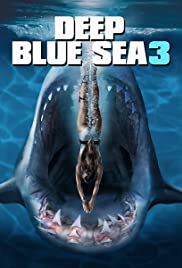
DEEP BLUE SEA 3
US, 2020, 90 minutes, Colour.
Tania Raymonde, Nathanial Buzolic, Emerson Brooks, Bren Foster.
Directed by John Pogue.
If there has to be a third in the Deep Blue Sea franchise, then it might as well be this one. It draws on the characters, in general, from the previous two films. But it also draws, quite substantially, on the previous plots, three Road Newton sharks, business interests, possible cure for Alzheimer’s, scientists and underwater exploration, collaboration and betrayals.
The film is strong on theme of climate change, the rising of the Seas, the disappearing of villages, especially here in the Mozambique Strait. There is a great deal of underwater photography – and an affirmation of the use of underwater drones. However, there is an expedition seeking the sharks, wanting to destroy them – because, if they mate, they will diss produce mutant offspring which will be destruction destructive of sea life.
Filmed in South Africa, two Australian male leads, tough action, especially on the part of the women – and, interestingly, it is only women who survive.
And, even for a sedate audience, there is a moment where they will leap from their seats as Richard dies into the water, straight into the mouth of the shark!
More or less as expected.
1. The Deep Blue Sea series, the 1990s, the gap of 20 years, two sequels?
2. Continuity of plot, Rogue sharks, mutants, destruction, business interests and profit, power and domination, alleged cure for Alzheimer’s? Pursuit of the sharks to destroy them?
3. The Mozambique island setting, filmed in South Africa? The village and the rising tide? The scientist setting up, their headquarters, technology? The underwater sequences? The variety of underwater life? Drone photography? The sharks and the special effects? The musical score?
4. Emma, strong character, qualifications, leader of the team? Underwater negativity and skills? Reliance on Eugene, memory of her father? His contribution? The members of the team, the rather nerdish young man, his skills and learning, attraction to the apprentice? Her presence, qualifications? Their work together?
5. The arrival of the ship, Richard and his past with Emma, their clashes? The story of the sharks? Their expedition, the business interests, Alzheimer’s cure? The lies, covering their intentions?
6. Emma, her response, the clashes with Richard? The urgency of the situation, the attack of the sharks?
7. Lucas, his role in the expedition, with Richard, his taking a stand, the business interests, Richard opposing – and the shock of his being swallowed by the shark? Lucas and his attack, firing at the village to destroy it?
8. Emma, Eugene top, Lukas setting the mine, Emma to dismantle it, attracting the sharks away, putting the mine on the ship, the explosion? Lucas surviving, coming ashore, the fierce fight with Emma?
9. Eugene, his final help, lowering the sharks away, destroying them, giving his life?
10. The two locals, the cook and the meals, his being killed, his wife’s grief? Her surviving with Emma, on the boat, the sideboard and the young woman emerging? Only female survivors?
Published in Movie Reviews
Published in
Movie Reviews
Saturday, 09 October 2021 13:03
Firestarter/ 2020
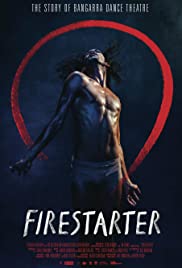
FIRESTARTER
Australia, 2020, 96 minutes, Colour.
Directed by Wayne Blair, Nel Minchin.
Firestarter was awarded best documentary film prize at the 2020 Australian Academy Awards. It is a documentary that should be seen. And it is been directed by celebrated actor-director, Wayne Blair, along with Nel Minchin, producer and director.
This is the story of the Bangarra Dance Company. We learn immediately that Bangarra means making fire, so the title of this documentary.
From Wikipedia:
Bangarra Dance Theatre was founded in October 1989 by Carole J. Johnson, an African-American? modern dancer and founder of the National Aboriginal and Islander Skills Development Association (NAISDA), Rob Bryant, a Gumbaynggirr man and graduate of NAISDA, and Cheryl Stone, a South African-born student at NAISDA.
Johnson toured Australia in 1972 with American choreographer Eleo Pomare and his company, and remained in Australia. In 1975 Johnson became the founding director of the Aboriginal Islander Skills Development Scheme, now known as the National Aboriginal and Islander Skills Development Association (NAISDA).
Johnson had a three-part plan for Aboriginal dance in Australia, including establishing a school to give academic qualifications and train dancers as members of a student and graduate performing company that would also teach. It would further provide a path for the dancers to other dance-related jobs, including choreography, tour management, and all front and back of house skills. Thirdly, a vital part was to maintain authentic cultural continuity, friendships, and close ties to traditional communities. Johnson mentored Stone, who studied alongside the dancers. She planned the formation of Bangarra and in 1989, became the founding Artistic Director of Bangarra Dance Theatre.
Stephen Page became the Artistic Director in 1991, supported by two of his brothers, David, a talented musician and composer, and younger brother, Russell, an extraordinarily talented dancer. The film offers a great deal of David Page’s music and some extensive footage of Russell and his dancing.
Stephen Page is the strong presence in the film, going back over the decades of the company, the initial vision that he shared with his brothers and the variety of people who joined him in the enterprise and have stayed with the company over the years. The film takes us back into the history of the Page family, the difficulties with their father, presence and absence, stern, the influence of their mother. And there were 12 children. They lived in Mount Gravatt in Brisbane, went to the local schools, grew up in the atmosphere of the 1960s and 1970s. There is an entertaining interlude where David, very young, but a talented singer, appeared in television contests, winning them, getting a contract with Decca Records, and appearing with Paul Hogan on his television show. They also got involved in local dancing.
Quite a number of women joined the company and are interviewed throughout the film. They reminisce about the beginnings, and there are images of many of them and their dance performances throughout the 90s.
And the performances are the significant aspect of the film, the making fire, the fire starting.
However, there is sadness in the narrative which is acknowledged, Russell and his difficulties, substance taking, moods, and, after his enormous success, his hanging himself, Stephen expressing the hope that it was some kind of accident. And then, David so lively in his collaboration with Stephen, so many compositions, also dying, the cause of death not revealed by the family. It was at this time that Stephen Page and the company received a Helpmann award – which he dedicated to his brothers. Russell Page’s son is one of the talking heads of the film and gives insights into his father. David was gay and, in 2008, Stephen directed him in a one-man show about his life, a drag act, his being gay.
Stephen Page’s son, Hunter, also appears with comment – and he also appeared in the production, Spear.
One of the great features of the film is the succession of excerpts from the prolific repertoire of the company from the early 1990s. With the aboriginal themes, Stephen Page has provided a dance overview of indigenous culture, traditions, history, rituals, symbolism… Which is seen in the variety of titles of the performances, Ochres, Fire, Skin, Boomerang, Corroboree, Walkabout, Bush, Bennelong (with favourable comments heard from Graeme Murphy, one of Australia’s great choreographers). The film also shows the tours by the company including overseas (and a photo opportunity with Prince Charles!).
In 2005, Stephen Page directed a feature film, Spear, featuring his son and other company dancers along with actor, Aaron Pedersen. It is filled with the same dance interpretations of history and culture – but has the added beauty and aura of location photography.
After the death of David Page, Stephen was particularly upset, drove his company hard, but needed time away to come to terms with what it happened – and is able then to hand over the management of the company to his successor, Frances Rings, choreographer and dancer.
The Bangarra Dance Company is a major contribution to Australia’s consciousness of its aboriginal heritage and traditions. In the film ends with a 2019 photo of the company, Stephen in front, a tribute to achievement.
Published in Movie Reviews
Published in
Movie Reviews
Saturday, 09 October 2021 13:03
Last of His Tribe, The
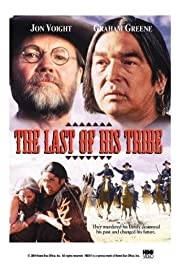
THE LAST OF HIS TRIBE
US, 1992, 91 minutes, Colour.
Jon Voight, Graham Greene, David Ogden Stiers, Jack Blessing, Anne Archer, Daniel Benzali.
Directed by Harry Hook.
Ishi, played by Graham Greene, is the last of the Yahi native Americans who lived in what became the state of California. This film is based on actual events and characters.
In 1911, Ishi was wandering the countryside, hungry, going into an abattoir and confronted by the owners. However, he is recognised as a Native American and handed over to the authorities. The difficulty is communication, the first authority, Thomas Waterman (Jack Blessing) does not have the vocabulary but makes contact with Prof Alfred Koebler who has several languages and is able to recognise Yahi words. Contact is made. The Professor is played, in a very restrained and academic style, by Jon Voight.
The film is mainly about Ishi and his survival, his being embraced by the white community and culture, his adaptation, his wanting to live his life in the community, the professor refusing to allow him to be relegated to a reservation, employing him as an assistant in the Museum the professor curates.
There are many of the expected situations, English words and cards for learning, issues of clothes and shopping, food, settling into a room… There is also a visit to Dr Pope, a rather exuberant type with a love of archery, in admiration for Ishi’s physical health and condition. The Professor decides to go on an expedition with Waterman, the doctor (with the promise of archery and hunting) and Ishi to find the land where Ishi lived (with flashbacks to the invasion of the shooters, the massacre, Ishi’s survival with his sister and mother). This offers Ishi the opportunity for some heartfelt lament for the dead.
The Profesor’s life is complicated by the illness of his sympathetic wife, Henrietta (Anne Archer) and her death, Ishi amazed at the reticence of the funeral and wake, no singing so that the deceased could go on the trail of the dead to the future life. The Profesor decides to take up a position managing a Museum in New York, farewelling Ishi, learning that he had contracted consumption and then dying, the professor telegraphing that there should be no autopsy, respecting Ishi’s body – but it is too late.
For dramatic ending to this story, the Professor in grief begins to sing the chant that he learned from Ishi.
1. Based on a true story? Native American Indians? Their life in the 19th century, extermination? The story of the Lone Survivor?
2. 1911, California, all museums, exhibits, technology, motor vehicles, lighting?
3. The introduction to Issue, wandering onto the property, in the abattoir, the men confronting him, recognising him?
4. Ishi as a man, his age, the revelation that he was the last of the Yahi? With the authorities, the experts, the attempted language, his not recognising words? Profdsor Kroeber, his communicating with Ishi, recognition?
5. The flashbacks, issue and his story, the shooters coming, the massacre, the grief, Ishi and his sister and mother, survival, their deaths? his wandering? Not wanting to return to the site? The eventual return, his memories, the occasion for grief, for singing, vaunting his ancestors to be on the death Trail?
6. Jon Voight as the professor, academic, restraint, his personal life, love for his wife, her illness, his being in denial about the illness, the impact of her death? His work, knowledge, the museum, his staff?
7. The professor taking on Ishi, language and communication, English words, cards and images and words, clothes, no shoes?
8. The effect on Ishi, his saying that he wanted to live in this new world, adapting, his room, food, language? The authorities wanting him to go on to a reservation? The professor employing him as staff? Ishi and his liking his work?
9. Dr Pope, hail-fellow-well-met, examining Ishi, admiration for his physical condition, the cast of his foot? His jokes? Archery?
10. The professor wanting to go back with Ishi, to get artefacts, to understand, Tom as his assistant, loyal, working with Ishi? The trek, Dr Pope, the hunting of the deer? Dr Pope and his singing, the contrast with Ishi and his behaviour, his grief? The return?
11. The professor, Ishi coming to the meal at the house, Henrietta asking the questions? The offer to go to New York, administering the Museum, tempted? His sense of failure with Ishi after the expedition, going to New York, the brief farewell?
12. The professor, the success of his work in New York? The news of Ishi’s illness, consumption, Ishi is death? The telegram that they not be an autopsy, too late?
13. The professor silent at his wife’s death, Ishi asking why he did not seem? The finale and the professor singing in grief for Ishi?
14. The film as a drama, an unusual friendship, white culture and the encounter with Indian culture, learning and not learning? The anthropological interest of the film?
Published in Movie Reviews
Published in
Movie Reviews
Saturday, 09 October 2021 13:03
Current War
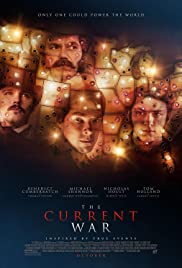
THE CURRENT WAR
US, 2017, 102 minutes, Colour.
Benedict Cumberbatch, Michael Shannon, Nicholas Hoult, Tom Holland, Matthew McFadyen?, Katherine Waterston, Tuppence Middleton.
Directed by Alfonso Gomez- Rejon,
Electricity. Electric current.
Electricity, inventions, applications, was one of the key elements of progress in the 19th century, especially in the United States. America eventually lit up the world. However, the development of electricity and its current, direct current, alternating current, was not a straightforward event. As this story indicates, there was a current war.
And the antagonists were the genius of Menlo Park, the multi-talented inventor, Thomas Edison. And, rivalry with an East Coast inventor, entrepreneur, George Westinghouse. The two men were not friends. There was an intense rivalry – and some tactics of warfare. But, into the picture comes the migrant from Europe, Nikola Tesla, intelligent, visionary, wanting a job, working for Edison for some time, disagreeing with him, fired, setting up on his own, engaging with Westinghouse, but finally being ousted from the pantheon of inventors. A number of viewers were very angry with this film feeling that it also ousted Tesla – although, it actually does tell the story of the migrant inventor, his talent, his experiences with both Edison and Westinghouse, and acknowledges that his abilities were not appreciated in his lifetime, and his dying in poverty.
The film had difficulties in its distribution, being part of the Weinstein company’s distribution and falling foul of the Harvey Weinstein scandals. It was released, withdrawn, edited it, a Director’s cut released in 2019.
In fact, cut is an apt word. The style and structure of the film involves a great number of cuts, editorial cuts, pieces of the drama, focusing on each of the protagonists, moving swiftly on to another, something of mosaic rather than an extended drama. While the screenplay covers the current war, it might have been more dramatically effective by concentrating on one, then on the other, building up the drama rather than being so episodic.
This is a Benedict Cumberbatch film. He portrays Edison as an intense man, not the easiest in terms of social relations, even in family, driven by his genius, the enormous range of his inventions, his desire for the patents and protecting his work, irrespective of money, grand plans, needing support of finances like JP Morgan (Matthew Mc Fadyen). We see him with his plan for illuminating a square mile in New York City.
In the meantime, there is his rival, George Westinghouse, played by Michael Shannon, a more sympathetic role than many of his dark characters and on-screen villains. He has an alternate theory about electricity, alternating current. Edison scoffs at this, even using/misusing a media campaign highlighting potential dangers of death by touch, especially as the method of alternating current is to be used in New York state prisons for the electric chair. Westinghouse is branded as a murderer. Yet Edison himself succumbs, although not wanting any of his inventions to harm human beings, to witness the electrocution of a horse and then to provide secret advice to the authorities about the effect of electric chair (his letters to be burnt, their being kept, stolen by Westinghouse and released to the media – warfare).
So, a portrait of each of the inventors, their rivalries, their bids for illuminating the 1893 Chicago World Fair, and dramatic encounter between the two at the fair. And, the subplot of Tesla, played by Nicolas Hoult, his ambitions, his visions, his failures.
While this film is interesting, there is room for further drama about these characters and their rivalries.
1. The title? Electric current? Inventions of the 19th century? In the United States? Edison, Westinghouse, Tesla?
2. The troubled release of the film, editing?
3. The structure of the film, the introduction to each character, his work, his background, a mosaic of short sequences illustrating each character, the situation with electricity, JP Morgan and business interests, rivalry, personal antipathy?
4. The portrait of Thomas Edison, his status in American history, as an inventor, the genius of Menlo Park, the range of inventions, the patents, the ambiguity of money, his being in need, yet protective of his inventions? Electricity? Current? The lightbulbs? Generation of electricity? The development of his current? Lighting the section of New York City, the appeal to the authorities, to Morgan, his staff, the developments? Tesla coming to work for him, his attitude, payment, disagreements, dismissing him?
5. The portrait of George Westinghouse, his talent, less inventive but distinguished in developing of lighting of cities, alternating current, the contracts, his success, the wide range? The meeting with Tesla, their discussions, collaboration?
6. The issue of the Chicago World Fair, the bids, the theory of current, Edison and his long explanation, Westinghouse and the brevity of his presentation, financial issues, the decision for him? The sequences at the World Fair?
7. The rivalry between the two men, in the media, Edison on the train ignoring Westinghouse, the issue of capital punishment, the use of alternating current, Edison not wanting having anything to do with electricity killing humans? The experiment with the horse and its death? The New York government approaching Edison, his agreeing to give advice about the current for the electric chair, the correspondence and his assuming that it was destroyed, its being kept, Westinghouse getting it? Edison and the campaign to indicate that Westinghouse was a killer? The plan backfiring on him?
8. The character of JP Morgan, finance, companies, electricity, the lighting of cities, the clashes with Edison and funding?
9. The background, Westinghouse and his wife and her support and collaboration? Edison, his supportive wife, the family? Edison and his commitment to his work, absences from home?
10. The role Tesla, the migrant, his talent, visionary, the approach to Edison, working for him, alternating current, his leaving, setting up his own company, the issue of finance, his being fired, collaboration with Westinghouse? His sad career, impoverishment?
11. A perspective on American history, the inventiveness of the 19th century?
Published in Movie Reviews
Published in
Movie Reviews